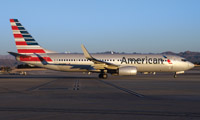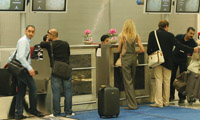Main Story
BATTLE LINES DRAWN
The International Air Transport Association’s drive to revolutionize the sale of airline tickets and services through new distribution capability (NDC) standards has become a major industry battlefront, coming under attack from a major section of the global travel agent community and some global distribution systems (GDS). The airline body is fighting back, accusing detractors of getting their facts wrong.
May 1st 2013
When the International Air Transport Association (IATA) filed an application with the U.S. Department of Transportation (DoT) in March for approval of its new standards for the distribution of airline services and products, known as the new distribution capability (NDC), it was aware the rumblings of discontent in some sectors of the travel industry were gathering momentum. Read More »
 |
| 'Corporate graveyards are full of companies that refused to adapt to evolving market conditions and did not embrace change' |
| Eric Leopold Director, Passenger Services IATA |
But the intensity of the objections to the NDC has put the global airline body into an unprecedented confrontation with a sector of the industry that sells six out of every 10 of its tickets.
With the charge led by bodies such as the Brussels-based Word Travel Agents Associations Alliance (WTAAA) and the U.S.-based Business Travel Coalition (BTC), IATA is facing a series of serious accusations which include:
• it developed the NDC in secret without regard to supply chain participants’ interests, including the end customer.
• the NDC raises serious privacy concerns and has been designed by airlines to allow them to raise air fares.
• it will remove the price transparency inherent in current systems, endanger neutral comparison shopping by travellers and give airlines too much power in the distribution process.
There have even been suggestions IATA is trying to eliminate GDS’ altogether. The association rejects this charge.
As the DoT considers IATA’s application to launch the NDC in the U.S., and globally, it will also review as a tidal wave of opposing submissions. IATA has launched a comprehensive counter-offensive through traditional media and social media outlets to persuade opponents of the value of th NDC. It describes most of the claims as “red herrings” and insists arguments against it are flawed or “flat-out wrong”.
The BTC has been particularly scathing, saying in a statement there is “zero doubt” airline chief executives will hear from their most valued corporate customers, distribution partners, anti-trust enforcers and data privacy regulators from around the world about the NDC.
 |
| American Airlines: expressed interest in taking part in NDC pilot programme |
“NDC is nothing less than an ill-considered public and government relations nightmare,” said the BTC.
“The goal for NDC is to terminate, by agreement among horizontal competitors, the current transparent model for the pricing of tickets, in which fares are published and publicly available for comparison shopping and purchase by all consumers on a non-discriminatory basis.
“To accomplish this goal, airlines would demand consumers’ personal data and put their privacy, security and mobility at risk.”
It says NDC will require consumers to give up substantial personal information before being provided with offers by airlines.
“The personal information includes, but is expressly said not to be limited to, name, age, nationality, contact details, frequent flyer numbers, whether the purpose of the trip (business or leisure), prior shopping, purchase and travel history and marital status.
“This information can be used to extract higher prices from less price sensitive consumers, such as business travelers,” added the BTC.
Nonsense, says IATA. And its fight back is coming from the top.
IATA Director general and CEO, Tony Tyler, responding to an editorial in the New York Times suggesting NDC would result in frequent flyers paying more for their tickets and passengers providing more personal information, said the comments were erroneous.
| New IATA blog confronts NDC debate In April, the International Air Transport Association (IATA) set up a New Distribution Capability (NDC) blog that will include all aspects of an initiative that has provoked heated debate in some sectors of the GDS and travel industries. IATA said in the mid-April announcement: “Since the approval of Resolution 787 last October, a vigorous public debate has evolved on how NDC - a new communications standard between airlines and travel agents - will impact on the travel value chain. This includes considerable misinformation from some entrenched interests in current distribution standards”. “NDC has energized the travel chain,” said an IATA statement. The blog will allow stakeholders and the distribution community to share ideas, facts and information about the project. “As such it will be a reference to correct the numerous myths and misinformation that have been introduced into the debate,” said IATA. |
In a letter to the editor, he insisted passengers would not require passengers to provide any more personal information than they do today when they ask for a fare quote.
“But for those who provide such information, NDC will enable the airline to personalize the offer, which is no different to a shopper visiting a retail web site,” said Tyler.
“Furthermore, airlines will have to conform to privacy laws and regulations governing customer data. And in a highly competitive business like aviation, travellers always have the option to take their business to another airline if they feel that they are being taken advantage of.”
The NDC follows years of airline dissatisfaction with the existing GDS system. They argue it has long been outdated and unable to adapt to the expanding range of offerings, including ancillary services, available from carriers.
They value their relationships with the GDSs, but are disappointed at the pace of innovation. While this may be changing, up to now the power of the GDSs has stifled ancillary sales, a growing and important part of their revenue stream, say carriers.
IATA has been developing the NDC standards for some time and had them approved as Resolution 787 at a joint IATA-Airlines of America Passenger Service Conference at the World Passenger Symposium in Abu Dhabi in October.
IATA was expected to name several airlines that will participate in a pilot NDC programme early this year, but details have not yet been released. The association has, however, said that American Airlines and Air Canada have “expressed interest” in taking part in the project.
Currently, airlines use internet programming language (XML) on their own websites. They offer travel consumers an online shopping experience similar to what they can find on retail websites such as Amazon.com.
However, the GDSs use a less flexible pre-Internet message protocol. This legacy infrastructure cannot efficiently support modern retailing practices such as personalized and customized offers.
“An airline that offers some extra leg room or a special meal option cannot entice the customer with this added value when selling through travel agents because the GDSs cannot present that information effectively and attractively,” said IATA’s director, passenger services, Eric Leopold.
“Furthermore, in most cases, the airline does not know anything about the customer until the reservation is made, making it difficult to personalize the offer, as is common in most internet retail activities.”
 |
Using an XML-based standard, NDC will offer a dynamic, vibrant marketplace that is not possible with today’s closed proprietary systems, according to IATA.
Tyler added that today’s air travel consumers don’t have easy access to all of the value-added options offered by airlines when they visit a travel agency or an online travel site. This is because the indirect sales channel remains largely dependent on the pre-internet messaging standards that provides agents with only basic information such as fare and travel class.
“Agents have been unable to easily see important product characteristics such as the availability of Wi-Fi or seat features,” said Tyler. “It is difficult to distinguish pricing alternatives like fares with fewer restrictions on travel changes.
“Consumers can already find all of this on airline websites. NDC will make the same choices—and future innovations—available wherever consumers choose to buy their travel products.”
| 'NDC is nothing less than an ill-considered public and government relations nightmare ' |
| U.S.-based Business Travel Coalition |
He said NDC would enable travel agents and travellers to comparison shop knowing they have access to the full value of an airline’s complete product offer, not just the base fare.
“Furthermore, airlines and agents can present customized offers to those customers that desire to be recognized. This happens on airline websites already. But I also want to be very clear. NDC will not require passengers to transmit any more information than they do today on airline websites or third party travel sites in order to get an offer.”
While the most fiery opposition is coming from travel agents, there is also a mixed reaction from GDSs themselves.
Svend Leirvaag, vice-president, industry affairs at Amadeus has described NDC as an attempt by major airlines at market manipulation. While the current model of distribution through GDS systems allows the travel agent to compare different airlines on an “apples to apples” basis, some larger airlines are attempting to influence travel agencies directly, he said.
Leirvaag believed the NDC would allow larger airlines to gain market share over smaller airlines which can’t invest the same amount in the technology required.
“The NDC is being driven by large airlines. It is not something that all airlines want or support. Small airlines are very concerned about it,” he said
| 'The NDC is being driven by large airlines. It is not something that all airlines want or support. Small airlines are very concerned about it' |
| Svend Leirvaag Vice-President, Industry Affairs Amadeus |
“What we are concerned about, and European regulators and global travel agency associations are too, is that the NDC will allow large airlines to increase their market power by differentiation against travel agencies and corporate clients.”
One global GDS, Amadeus, has consistently said it welcomes all constructive debate and suggestions on ways to improve and evolve the travel distribution system.
“Nonetheless, we would like to stress that Amadeus believes that global distribution systems continue to be unmatched as the most efficient, proven means of distribution between airlines and travel agents to travellers.
“GDSs are the best and most effective aggregators of content to the benefit of travel agents in terms of costs, efficiency and reliability. Equally, GDSs represent the best value and most efficient means for airlines to distribute their tickets to the largest possible market.
“Just as importantly, GDSs provide the most transparent, comprehensive choice and comparison of airlines’ travel options to consumers.”
Rival GDS, Sabre, has been concerned about privacy aspects. Shelley Terry, vice-president of airline merchandising for Sabre Travel Network said it has been involved with IATA on NDC since the outset.
“Our observations are based on a detailed analysis of everything IATA has said. Put simply, we don’t see how it would work without sacrificing fare transparency, limiting comparison shopping and compromising data privacy rights,” she said.
Her biggest concern is the personalization of fare offers. “Why do you need to tell an airline your marital status, what nationality you are or your purchase history before they give you a price? This really does start to cross the line,” said Terry.
| NDC ‘GDS on steroids’ Eric Leopold, IATA’s director of passenger services, last week described the new technology as a “GDS on steroids.” “Low-cost carriers are using the same API [application programming interface] we are developing,” he said. GDSs now download data from vast databases of fares, routes and schedules maintained by the Airline Tariff Publishing Co. (ATPCo) and OAG. The information in these databases, which is constantly updated by airlines, is supplemented by direct feeds from airlines to the GDSs. IATA wants distribution channels to receive more - or all - content directly from airlines instead of pulling fares and scheduling from what Leopold called “archaic” filing systems. |
Sabre called NDC “an agreement among the airlines to withhold content by not publicly filing their content”.
In the Asia-Pacific, the Singapore-based GDS Abacus, which is owned by airlines, has welcomed IATA’s creation of a new distribution platform.
Similarly, travel distributer, Travelport, has consistently been an advocate of the need for industry standards in travel distribution and “believes this to be in the interest of all parties involved in the travel supply chain”.
IATA reacted strongly to a WTAAA press release last month that claimed the NDC appears to eliminate or reduce consumer ability to carry out neutral comparison shopping, which currently promotes competition of airfares between carriers and will impose huge costs directly on travel agencies, and indirectly to their customers, because travel agency systems and processes would need to be redesigned.
IATA’s Leopold said these arguments were flawed. “Customers do not have the ability to carry out ‘neutral comparison shopping’ through the indirect GDS/agent channel,” he said.
“Not all carriers make all their fares available in the GDS channel. Furthermore, a number of airlines, including many LCCs, do not participate in GDSs at all. These are commercial decisions made by airlines, not related to the technical standard that is used.”
Leopold said the purpose of NDC is to enable travel agents and travel management companies to have access to the same airline products and services being offered for sale on airline websites and also to offer their customers the same options for customization and personalization available on airline sites.
“NDC will enable full price transparency on complete airline offers as well as on the base fare. Rather than competing only on base fares, NDC will result in airlines competing vigorously across the spectrum of products and services, something that can only make the overall travel experience more rewarding,” he said.
“Additionally, the NDC data transmission standard will open up the airline distribution market to much needed competition and new entry, which could lead to lower distribution costs. Historically, consumers have benefitted when airline cost inputs declined.”
Leopold also refuted claims the NDC provides for “a GDS bypass” and could require agents to book through NDC only.
“In fact, as IATA has made clear on numerous occasions, NDC includes an aggregator function, the role performed by GDSs. Claims that carriers will charge for access to content also make absolutely no sense given that the likely result would be that agents would simply decline to work with that airline,” said Leopold.
“There’s absolutely nothing in Resolution 787 to support either of those claims. A key motivation behind NDC is to provide travel agents with improved access to airline product offerings, not to make it impossible for them to access the offerings.”
He pointed to GDS, Travelport, which recently unveiled a new merchandising platform that involves significant modernizing of its technology.
Travelport said it would allow travel agents to access the full range of airline products, including ancillaries, in their current workflow.
“It provides complete consistency for an airline to present its product portfolio and to sell it across all channels,” said Derek Sharp, Travelport’s managing director, global distribution and sales.
“Carriers want their offerings in the third party channel to be made available in easy-to-search displays rather than hard-to-decipher code. They don’t want cumbersome technology workarounds and lengthy beta programmes to delay or hamper their marketing innovations,” Leopold said.
IATA said: “Some continue to fight tooth and nail to preserve the status quo. But corporate graveyards are full of companies that refused to adapt to evolving market conditions and did not embrace change,” said Leopold.
“Travel agents naturally want greater access to travel supplier content and the ability to make fully informed choices for their customers.
“Their interests will be best served by distribution partners that deploy the travel industry equivalent of a 21st century automobile, rather than hanging onto the Model-T.”
IATA denies it has attempted to push through new standards in secret, saying it has and continues to engage “with all participants in the travel chain, including travel agents, agent associations, airlines, GDSs and other technology providers”.